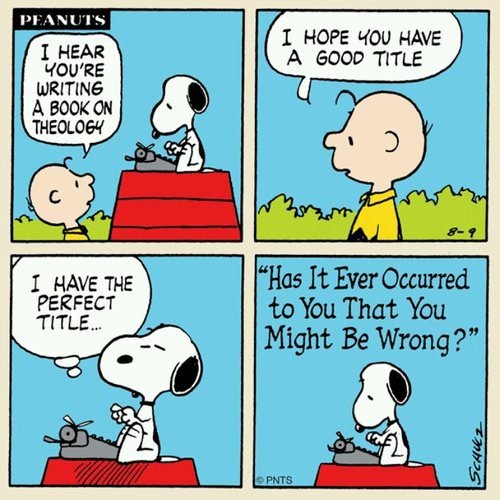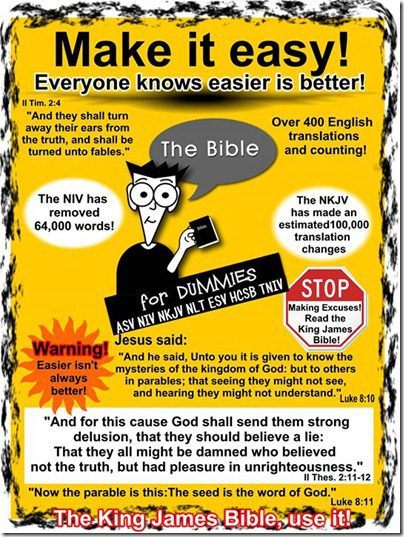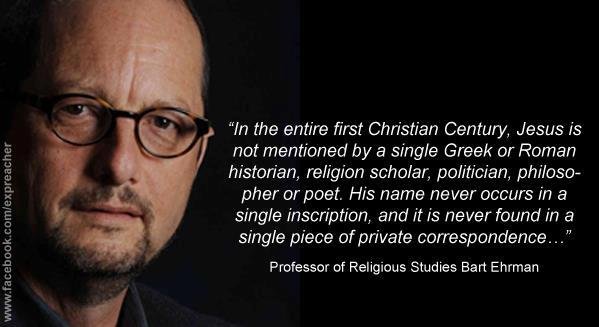
I recently asked readers to submit questions to me they would like me to answer. If you would like to submit a question, please follow the instructions listed here.
Mary asked: Bruce, how did you make the final break from [religious] belief? I still vacillate quite often and struggle w/the emotional turmoil that follows. thanks for taking time to answer the questions we are posting.
As an Evangelical, I could point to the date, time, and place Jesus saved me. I know when and how I was saved because I was there when it happened. For most of my life, I had what Evangelicals call a know-so salvation. The Apostle Paul had a know-so salvation too. In his letter to a young preacher by the name of Timothy, Paul wrote:
For the which cause I also suffer these things: nevertheless I am not ashamed: for I know whom I have believed, and am persuaded that he is able to keep that which I have committed unto him against that day. (2 Timothy 1:12)
Being a Christian, then, was all about “knowing”; about certainty of belief. The same cannot be said for my current state of unbelief. I have written tens of thousands of words about my deconversion and how I went from a preacher of the gospel to no longer believing the “truths” I once preached. I can point to the date when I attended church for the last time, and I remember the day when I said to myself (and to my wife), “I am no longer a Christian.” I can point to the 2009 letter I wrote to Family, Friends, and Former Parishioners as my equivalent of Martin Luther’s Ninety-five Theses. Yet, I haven’t had what I call a born-again atheist experience, and I don’t know many unbelievers who have.
The path from belief to unbelief is often long, arduous, and littered with stops, reversals, collisions, and a host of other things that complicate deconversion. In my case, I was part of the Christian church for fifty years. I spent twenty-five of those years pastoring Evangelical churches. Days, months, and years were spent devotedly worshiping and serving Jesus Christ. Tens of thousands of hours were given to reading and studying the Bible, reading theological tomes, praying, preaching, teaching, evangelizing the lost, and ministering to the needs of congregants. I was as deeply immersed in Evangelical church life as anyone could be. I was a sot in a religious sense, drinking in all that Christianity had to offer. Becoming an unbeliever, then, required detoxification. My mind was, and still is, filled with knowledge about Christianity, the Bible, and the experiential aspects of faith.
Unbelief is a frontal assault and challenge to a life of religious belief. For decades, I said I believed this or that. I was sure of my beliefs, having no doubt whatsoever that what the Bible said was absolute truth. It was only when I allowed agents of unbelief a seat at the table of my life that I began to have questions and doubts. These honorable, thoughtful voices of doubt and unbelief asked of me what the Devil asked of Adam and Eve in the Garden of Eden, Yea hath God said? Answering (and continuing to answer) this question caused doubt and further questions. Questions begat questions, to use King James vernacular. This steady stream of questions ultimately led me to conclude that what Christians believed about the Bible was not true, and that the Christian narrative could not be rationally or intellectually sustained (at least to my satisfaction). I came to see that believing the Biblical story about God and Jesus required faith, a faith I did not have.
So, I can point to the last Sunday in November 2008 as the last time I attended church, but I can’t, even today, say that all vestiges of Christianity are gone from my mind and life. I suspect, thanks to my deep immersion in Christianity, that my life will never be totally and completely free of Christianity. What’s gone, though, is the hold religious belief had on my intellect; on critical thinking skills; on my thought processes. Belief and unbelief are more like two ships passing in the night. The farther I journey away from belief, the more comfortable I am with unbelief. Of course, Evangelicals will tell me that what is really happening is that my heart is growing cold and dark and that I am becoming a reprobate — one who passes a line of no return when it comes to the Christian God. I am far enough along in my journey that I can dismiss out of hand all such denunciations as the masturbatory verbalizing of people who can’t figure out my story and fear that they too could lose their faith. Feeling cornered, zealots lash out at Evangelicals-turned-atheists with cheap, shallow, worn-out apologetical arguments or turn to lambasting them in blog posts, forum comments, social media posts, and sermons. None of these things bothers me in the least now. I see such reactions from believers as their attempts to square with their theology how it is possible for such a devoted follower of Christ as myself to totally abandon the beliefs he once held dear. Baptists, in particular, have a big problem with trying to square their soteriological beliefs with my storyline. Finding themselves unable to square things theologically, they conclude, absurdly, that I am either still a Christian or I never was one.
I remember the near-constant emotional turmoil I experienced during the early days of deconversion. Long-held beliefs were demanding attention. Bible verses flooded my mind, reminding me of what happens to those who reject Christ. Christian friends and family members and colleagues in the ministry piled on in their attempts to stop me from sliding further down the proverbial slippery slope. All of these things, along with more late-night wrestlings with doubt than I care to remember, caused quite a bit of emotional upheaval. But, over time, these things began to fade into landscape in my rear-view mirror. All I can say to Mary is this: be patient. Deconversion takes time. To quote a well-worn cliché, life is a journey, not a destination. The destination for one and all is the same: death. What matters, then, is the path we walk among the living. Here’s the advice I give on my About page:
You have one life. There is no heaven or hell. There is no afterlife. You have one life, it’s yours, and what you do with it is what matters most. Love and forgive those who matter to you and ignore those who add nothing to your life. Life is too short to spend time trying to make nice with those who will never make nice with you. Determine who are the people in your life that matter and give your time and devotion to them. Live each and every day to its fullest. You never know when death might come calling. Don’t waste time trying to be a jack of all trades, master of none. Find one or two things you like to do and do them well. Too many people spend way too much time doing things they will never be good at.
Here’s the conclusion of the matter. It’s your life and you best get to living it. Someday, sooner than you think, it will be over. Don’t let your dying days be ones of regret over what might have been.
I have found that the more I focus on the things mentioned above the less I find myself bothered by doubts and questions about the rightness of my decision to walk away from Christianity. I suspect that I will always have niggling doubts about the matter, but I no longer fear being wrong or worry about eternal damnation. As the old gospel song goes, I have gone too far to turn back now. I have weighed Christianity in the balance and found it lacking in every way. While another deity of some sort may yet appear on the horizon — and when it does I will weigh its claims as I did the claims of Christianity — I am confident that the God I once served is no God at all. Coming to this place took time, so to Mary I say, relax and enjoy the journey. You likely intellectually already know that Christianity (along with other religions) is false. All that remains is for your emotions and psyche to sync with what you know to be true.
About Bruce Gerencser
Bruce Gerencser, 61, lives in rural Northwest Ohio with his wife of 40 years. He and his wife have six grown children and twelve grandchildren. Bruce pastored Evangelical churches for twenty-five years in Ohio, Texas, and Michigan. Bruce left the ministry in 2005, and in 2008 he left Christianity. Bruce is now a humanist and an atheist. For more information about Bruce, please read the About page.
Bruce is a local photography business owner, operating Defiance County Photo out of his home. If you live in Northwest Ohio and would like to hire Bruce, please email him.
Thank you for reading this post. Please share your thoughts in the comment section. If you are a first-time commenter, please read the commenting policy before wowing readers with your words. All first-time comments are moderated. If you would like to contact Bruce directly, please use the contact form to do so.
Donations are always appreciated. Donations on a monthly basis can be made through Patreon. One-time donations can be made through PayPal.



 Several readers have asked me to explain the belief that the King James version of the Bible alone is the inspired, inerrant, infallible Word of God for English-speaking people. With this post, I hope to shed some light on what is commonly called King James-Onlyism; the belief that the only true Bible for English-speaking people is the King James version. While this system of belief is absurd and irrational, millions of Americans believe that the King James Bible is the one true Word of God. These same people, by the way, tend to be anti-evolution, young earth creationists. I grew up in King James-Only churches, attended a King James-Only Bible college, and believed, for many years, that the King James Bible was the perfect Word of God.
Several readers have asked me to explain the belief that the King James version of the Bible alone is the inspired, inerrant, infallible Word of God for English-speaking people. With this post, I hope to shed some light on what is commonly called King James-Onlyism; the belief that the only true Bible for English-speaking people is the King James version. While this system of belief is absurd and irrational, millions of Americans believe that the King James Bible is the one true Word of God. These same people, by the way, tend to be anti-evolution, young earth creationists. I grew up in King James-Only churches, attended a King James-Only Bible college, and believed, for many years, that the King James Bible was the perfect Word of God.


